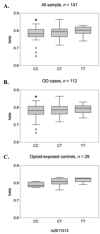Genomewide Study of Epigenetic Biomarkers of Opioid Dependence in European- American Women
- PMID: 30874594
- PMCID: PMC6420601
- DOI: 10.1038/s41598-019-41110-7
Genomewide Study of Epigenetic Biomarkers of Opioid Dependence in European- American Women
Erratum in
-
Author Correction: Genomewide Study of Epigenetic Biomarkers of Opioid Dependence in European- American Women.Sci Rep. 2019 Dec 5;9(1):18774. doi: 10.1038/s41598-019-55022-z. Sci Rep. 2019. PMID: 31801960 Free PMC article.
Abstract
There is currently an epidemic of opioid use, overdose, and dependence in the United States. Although opioid dependence (OD) is more prevalent in men, opioid relapse and fatal opioid overdoses have recently increased at a higher rate among women. Epigenetic mechanisms have been implicated in the etiology of OD, though most studies to date have used candidate gene approaches. We conducted the first epigenome-wide association study (EWAS) of OD in a sample of 220 European-American (EA) women (140 OD cases, 80 opioid-exposed controls). DNA was derived from whole blood samples and EWAS was implemented using the Illumina Infinium HumanMethylationEPIC array. To identify differentially methylated CpG sites, we performed an association analysis adjusting for age, estimates of cell proportions, smoking status, and the first three principal components to correct for population stratification. After correction for multiple testing, association analysis identified three genome-wide significant differentially methylated CpG sites mapping to the PARG, RERE, and CFAP77 genes. These genes are involved in chromatin remodeling, DNA binding, cell survival, and cell projection. Previous genome-wide association studies have identified RERE risk variants in association with psychiatric disorders and educational attainment. DNA methylation age in the peripheral blood did not differ between OD subjects and opioid-exposed controls. Our findings implicate epigenetic mechanisms in OD and, if replicated, identify possible novel peripheral biomarkers of OD that could inform the prevention and treatment of the disorder.
Conflict of interest statement
Dr. Kranzler has been an advisory board member, consultant, or CME speaker for Alkermes, Indivior and Lundbeck. He is also a member of the American Society of Clinical Psychopharmacology’s Alcohol Clinical Trials Initiative, which was supported in the last three years by AbbVie, Alkermes, Ethypharm, Indivior, Lilly, Lundbeck, Otsuka, Pfizer, Arbor, and Amygdala Neurosciences. Drs Kranzler and Gelernter are named as inventors on PCT patent application #15/878,640 entitled: “Genotype-guided dosing of opioid agonists,” filed January 24, 2018. Drs Montalvo-Ortiz, Cheng and Zhang reported no biomedical financial interests or potential conflicts of interest.
Figures




References
-
- Compton, W. M. & Volkow, N. D. Abuse of prescription drugs and the risk of addiction. Drug and alcohol dependence. S4–7 (2006). - PubMed
Publication types
MeSH terms
Substances
Grants and funding
LinkOut - more resources
Full Text Sources
Medical

